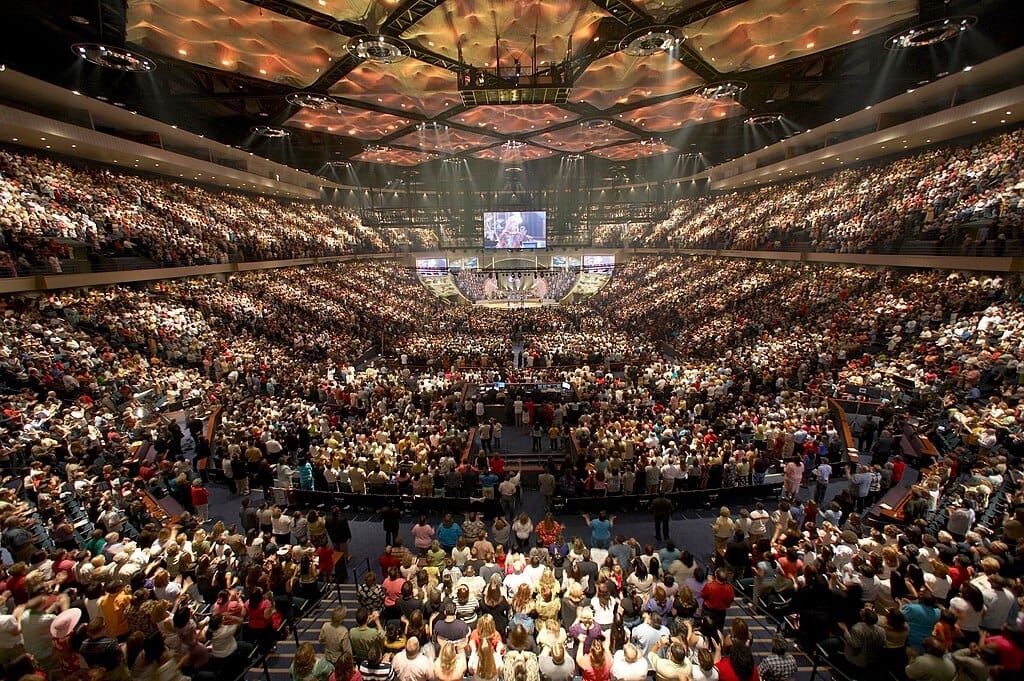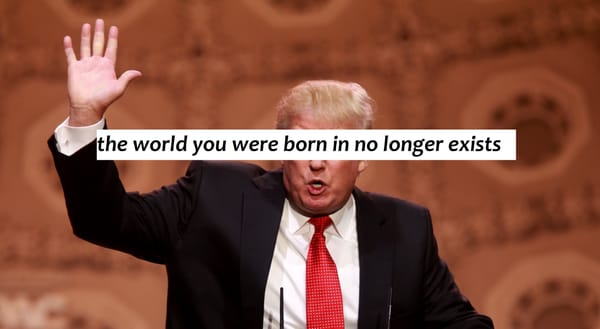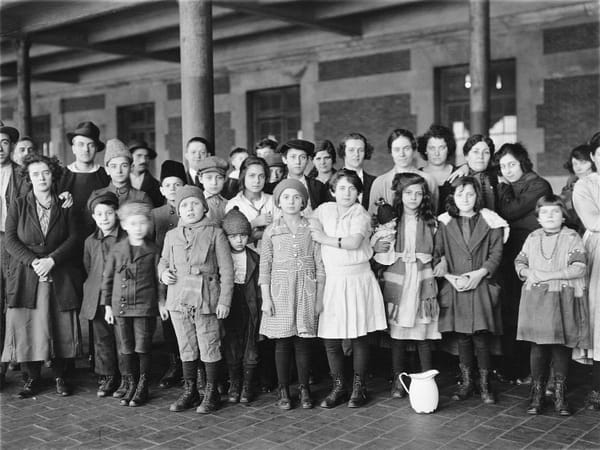The Red State Religious Narrative
Southern democracy, like every other aspect of Southern society, was shaped by the political and economic needs of the slaveholding planter class and is maintained by the MAGA movement via shame and projection.

In a compelling piece for The Bulwark, Alan Elrod argued that liberal democracy had never taken deep root in the American South and that the Trump era represented the spread of Southern-style, weak-sauce democracy—defined by single-party cronyism and a commitment to unrestrained capitalism and social control—to the national level. He explained how Southern democracy, like every other aspect of Southern society, was shaped by the political and economic needs of the slaveholding planter class. Among other strategies, they shored up their power in the face of massive white economic inequality using virulent racism that convinced non-slaveholding whites that Black freedom and equality threatened their own social and economic standing, and even their very lives. The South continues to bear the scars of what economists Daron Acemoglu and James Robinson call an extractive political and economic system, in which institutions are designed to protect the wealth and power of a privileged class at the expense of broader opportunity, innovation, and the rule of law.
White evangelicals and Trump
Undergirding this system from almost the beginning has been a form of Christianity now known as white evangelicalism. Beginning with pro-slavery theology in the antebellum era and up to the present day, when, on average, over 80 percent of white evangelicals have voted for Trump in three elections, establishing a religious narrative to justify and preserve the established order has made dismantling it, and social change in general in regions where it thrives, that much harder. People's religious beliefs speak to their deepest human needs, and authoritarians like Donald Trump have always known that co-opting and exploiting religion is a highly successful power-grabbing strategy. The more rigid and certainty-based the religion, the easier it is to manipulate its followers, who are already primed for the absolutist thinking, pat solutions, and unquestioning obedience that fuel authoritarian movements.
In red states, the religious narrative of white evangelicalism is deeply interwoven with right wing politics, even for those who are not particularly religious. Over the last several decades in particular, white Southern Christianity, like Southern politics, has also gone national. The red state political narrative—in which party or culture trumps all, economic inequality is seen through the lens of race, gender "chaos" is threatening, and economic freedom is combined with social control--is also a religious one. In the South, evangelicalism emerged in defense of and partnership with slavery, evolved into a tool of segregation and Jim Crow and to limit social change more generally, and today provides a crucial form of identity for many MAGA voters.
Evangelical theology and racial hierarchy
Evangelicalism didn't always thrive in the South. As the Great Awakening gained steam in the 18th century in the United States, it lagged in the South, primarily because the most influential people—large landholders—were put off by its democratic bent and potentially radical results. Instead of investing religious authority in institutions and clergy, evangelicalism elevated the spiritual worth and experience of the individual believer. It was the religious version of "All men are created equal," and like the ideology of the American Revolution, its ramifications were potentially radical.
Both the political and religious revolutions of the 18th century made slavery more morally conspicuous. In hierarchical societies, slavery was just another social and economic bond of deference and obligation, and in the early days of slavery in North America, it wasn't as strictly racial. Black slaves, free Blacks, and Black and white indentured servants mingled within the mélange of colonial labor. But as mortality rates improved, slavery became more lucrative. And as hierarchy broke down and the individual became elevated, the idea of slavery became more problematic. Race as a justification for slavery hardened over time. By the 19th century, when the invention of the cotton gin gave slavery new economic life, racism was a full-fledged, virulent, highly defensive ideology.
That's when slavery and racism acquired a fleshed out theology, too. By the early 19th century, evangelicals in the South had adapted their message to the needs of the slaveholding class, supercharging the success of evangelical Christianity in a region where it had once struggled.
Southern evangelicalism developed a decidedly different cast from that of its northern counterpart. Both made individual faith and conversion the centerpiece. Varieties of both limited the radical out-workings of that (most northerners were no champions of racial and gender equality). But North and South developed increasingly divergent theologies that are visible to this day in the divide—no longer strictly geographic--between white evangelicals and their more theologically liberal counterparts, what are now called mainline Christians.
Northern evangelicals emphasized individual faith as a basis for accommodating the societal change sweeping through the North as a result of the market revolution. Flush with the optimism of the American Revolution and propelled by rapid economic growth, they envisioned the United States as a perfectible society. Reform movements and voluntary societies proliferated in the antebellum North. On the more conservative side of the spectrum, reform movements like temperance aimed at mitigating the downsides of broader social and economic trends.
More radical reformers, an influential minority of northerners who were often mocked and reviled by the majority, advocated for women's suffrage and joined abolitionist societies. Northern evangelical theology discussed the afterlife, but that seemed of secondary concern when there was so much to be done in the here and now. Most Northern evangelicals believed Christ would only return after his kingdom was already established on Earth through the work of his followers.
Southern evangelicalism likewise adapted to its environment, a languid, agrarian economy and a traditional, hierarchical society held hostage by the extractive economic system of slavery. Southern society eyed the rapidly changing North with suspicion and increasing paranoia, for fear its culture would travel south and not only destroy the Southern way of life, but potentially spark a deadly slave rebellion. Pro-slavery Christianity became one of the planter class's most effective ideological weapons for defending their power-and their own consciences—from any criticism of slavery, including the implicit critique embedded in efforts to limit slavery’s westward expansion.
White Southern Christianity's overt racism, including a tortured extrapolation from the story of Noah's ark asserting that Blacks were designated by God as inferior, was dressed up with more respectable beliefs that continue to be the foundation for white evangelicalism to this day. First, a literalist/textual approach to scripture—written during a time of slavery and patriarchy—allowed southerners to isolate individual verses that appeared to condone slavery by acknowledging its existence without condemnation and instructing slaves to obey their masters.
Second, a heavy emphasis on the afterlife and the need to save souls over bettering society here and now justified slavery as a way to convert otherwise doomed "heathen" people, mollified those converted slaves with promises of eventual heaven, and warned off the potentially disruptive push for social betterment with the message that none of it mattered for eternity anyway. And lastly, defining Christian faith and salvation entirely in terms of personal behavior and conduct refocused attention and energy away from the abundance of scriptures aimed at sins with societal implications, such as the love of money, the exploitation of people in its pursuit, and the abuse of power.
Evangelicalism in the North and South developed to meet the needs and nature of the society around it. In the North, dynamic social and economic shifts were underway, fostering a form of evangelicalism that was more flexible and accommodating of change. In the South, evangelicalism became a bulwark for the ascendant planter class to defend the rigid economic and social hierarchies that sustained their wealth and power. And Americans in both North and South turned to faith as justification that their way of life was superior. The Civil War was a religious war in addition to a racial, economic, and political one. As Lincoln said in his Second Inaugural Address, both sides prayed to the same God and read from the same Bible. What that Bible meant depended on the location of the pulpit.
After the Civil War, these theological battles morphed from an argument about slavery into a more theoretical one about biblical authority that persists to this day. White Christian America became less divided by the Mason-Dixon Line (although that's still present) and more sorted by categories of rural vs. urban, education level, and class. In the present day, all these divisions survive, but the separation is more overtly defined by partisan politics, red vs. blue states.
Christian fundamentalism vs. social change
Southern-style evangelicals became inerrantists or fundamentalists, those who believe that the Bible is the unadulterated word of God and its literal interpretation (as determined by whoever controls the mantle) is appropriate for all times and places. Inerrancy was a more explicit, fulsome articulation of Southern theologians’ textual use of the Bible to prop up slavery, and after the Civil War, Christianity in the South became a tool to reestablish the white, male-led order in the wake of slavery's demise. Narrowly defining "true" Christianity and establishing ownership of that through strict doctrinal tests was a way to discredit those who threatened established authority, including Black Christians (many of whom were and are inerrantists themselves).
An emphasis on personal sin and salvation persisted and increasingly featured an obsession with sexual purity, particularly the sexual purity of white women. This focus was about controlling women as well as Black people. Purity policing gave white patriarchs new purpose and enhanced authority, and it justified the brutal repression of Blacks. Many if not most of the thousands of lynchings that took place in the seventy-five years after Reconstruction began with allegations of Black male lasciviousness towards white women. Lynching was thus a punishment for crossing both a social line and a spiritual one, as underscored by the Klan’s use of a burning cross as a means of intimidation.
Just as they had in the context of slavery, Southern evangelicals viewed government and the rule of law as a threat to maintaining their “way of life,” now based on Jim Crow and racial violence, and to white male authority more generally. But their Northern counterparts increasingly saw the government as a more essential tool for solving social problems, and their more flexible theological framework continued to accommodate change just as southerners’ continued to resist it.
The theological opponents of fundamentalists were proponents of higher criticism, an academic study of the Bible that interpreted and evaluated it according to history, context, linguistic study, scientific discovery, and broader Christian themes. Inerrancy's application was purposefully conservative, preserving the social order and the place of white men in it, whereas theological liberals' faith was more elastic, adaptable, and responsive to societal trends. Like their antebellum forebears, liberal white Christians in the late 19th and early 20th century put their energies into the here and now, believing in a "Social Gospel" that obligated them to better society.
During the Progressive Era, they developed a belief in the capacity and moral responsibility of government in this process. It must be said, however, that most liberal white Christians for most of American history continued to leave racial equality out of their drive for reform. But their overall posture toward change and their more elastic theological framework over time guided mainline white Christians toward more politically liberal views on a host of issues and a politically progressive message: that social problems result not from simply sinful human nature, but from flawed systems that only government is equipped to address.
White evangelicals, on the other hand, have sought to hold back social change and discount the structural roots of social problems. Fundamentalists at the time--and white evangelicals today—labeled higher criticism and the Social Gospel as heresy. During civil rights, most white evangelicals stubbornly supported segregation until its last dying breath. They described racism in terms of personal sin and believed its social evils were best erased through individual repentance.
Once segregation was defeated in law and no longer acceptable in polite society, this defensive theology adapted to new fights. White evangelicals moved on to other issues and causes to shore up their vision for the social order and contain the tsunami of social change coming out of the 1960s, most notably related to gender. It has been widely observed that evangelical interest in abortion, for instance, only started in the late 1970s, as the architects of the Religious Right searched for a new rallying cry to replace segregation. Evangelical denominations like the Southern Baptists have hardened their positions on the ordination of women and the submission of women to male authority in the home. LGBTQ issues were added to that slate. The inerrancy doctrine has continued to protect male authority, ward off social change, and discredit other Christians who push for greater acceptance and equality.
White evangelicals also retooled their approach to race to focus on "colorblindness,” or the idea that race is invisible to God and therefore should be to Christians. At first glance, this view seems compatible with racial equality. But in practice, it has negated any discussion of race or the Black experience, denied the enduring legacy of slavery and discrimination, facilitated the erasure of history, and labeled those who bring it up as "divisive." White evangelicalism's focus on personal sin over societal structures continues to insist that racism only exists in a few bigoted hearts. And it continues to reject the idea that government has any place in addressing prejudice.
What I've presented here is a gross oversimplification of the history and variety of white American Christianity, but the larger point remains: in broad strokes, Northern- and Southern-style evangelicalism evolved into separate white religious narratives that still undergird two separate political visions even as American society in general becomes increasingly secular.
White evangelical logics in today’s america
Today, white evangelicalism still rebuffs social change and creates a permission structure for reactionary politics. It fuses religious notions of sinfulness and righteousness with specific political positions and behaviors, family structure, and economic success. And it presents societal ills as the province not of government but of Jesus.
I grew up in white evangelicalism with an all-encompassing narrative that essentially positioned "our kind" as the superior sort and others' conversion to "our kind" as the path to salvation in the afterlife--a huge emphasis--but also success in this life. Not necessarily to material success, although that narrative thread is explicitly woven into some evangelical contexts, but to being the right kind of person, a person who has a stable family and job and is a good citizen. We had The Truth, we knew all the answers to the universe, we had the solutions to all problems, whether personal or societal. A rigid biblical interpretative framework provided the basis of this certainty and of the authority of those who controlled the narrative.
Just Add Jesus, and everything will be okay. Drugs? Just Add Jesus. Marital strife? Just Add Jesus. Anxiety and depression? Just Add Jesus. Crime? Jesus. Racism (to the extent that its existence was acknowledged)? Jesus. Poverty? Jesus would not eliminate it—certainly not in the African context in which I grew up—but one's chances of survival would be improved by following the Evangelical Way.
The Evangelical Way entailed giving your life to Christ as your Personal Lord and Savior and letting him change your heart and behavior. And as your behavior improved, so too would the results of your life. The primary measures of this were shunning all but straight, marital sex, breaking addictions to drugs and alcohol, letting go of all the worry and negativity that clouds your mind, developing a strong work ethic and being a model employee; if you were a man, being a good leader and provider for your family; if you were a woman, obeying your husband and devoting yourself to your kids, and generally being a responsible person who didn't burden anyone else.
People who struggled in life probably deserved it, and social problems resulted from too many badly behaved people, people who needed Jesus. This had a way of perpetuating a more subtle form of racism, since Black Americans were more likely to be poor, in jail, unmarried, unemployed, and in trouble. It also discredited Black Christianity, and I grew up thinking of Black Christians—who basically shared our same theology but had the annoying habit of reading the Bible through the lens of justice—as not the real deal.
In red states, this narrative holds up pretty well. Plagued by poverty, crime, and lower educational levels and with few if any non-Christian institutional supports, giving your life to Christ is a pretty good way, if not the only way, to improve your lot. I used to describe the west Texas town where I lived for 6 years as having two cultures--respectable church people and the strippers-and-meth crowd. It seemed Jesus was a major, if not the only, pathway to move from one to the other. I have personally seen people turn their lives around in the context of evangelical Christianity. Everyone in a red state knows someone like this, if not several.
I grew up believing that for society to improve, evangelical Christianity needed to be propagated and evangelical solutions needed to become policy, and to achieve that, we needed political power. Liberalism, pluralism, secularism—all these things threatened to destroy America and our place in it. Back then, in the 1980s and ‘90s, it was a given that we would win power by winning elections. Evangelicalism was growing at that time, so it stood to reason that white evangelicals could be politically ascendant if they fully mobilized.
But the movement has been in steady decline for over twenty years now. Worse, the children who grew up steeped in it are leaving in large numbers. White evangelicals have lost faith in their ability to win legitimately. And so, just like their nineteenth century forebears, many are willing to go to war.
The red state religious narrative, in which white evangelicals are the best people and have all the answers, always contained some holes for me. I was the child of the movement's supposed heroes, overseas missionaries, and yet I saw missionaries not just struggle and fail, but in some cases commit abuse and even crimes. Still, I was so brainwashed with the Evangelicalism is The Best narrative, I mostly retained my belief.
That is, until I left the evangelical bubble, and especially when I moved to a blue state. My community now is more successful both economically and socially, its families are more stable, its children are better behaved, its streets are safer, and its social problems are fewer. It is also highly secular and more liberal. To be blunt, my friends and neighbors here are kinder, more accepting, more caring, and more tolerant of difference as a collective than were the white evangelicals amongst whom I almost exclusively spent the first half of my life. Certainly, they are far more committed to true democracy, which values pluralism over social control and is more willing to sacrifice some measure of personal economic interest for the greater common good.
Shame and projection have been key modalities of both the Southern-style political and religious narratives throughout American history. Psychologist (and evangelical Christian) Dave Verhaagen has called white evangelicalism a culture of "collective narcissism," and he cites studies showing higher than average levels of Narcissistic Personality Disorder among white evangelicals compared to the general population. Narcissistic thinking tends to create grandiose personas and narratives to let us hide and deflect from deep-seated shame.
Pro-slavery theology was created for that very purpose at a time when Southern slaveholders felt morally embattled. The KKK claimed to protect white women from Black men, when in fact white slaveholders wantonly raped Black women. Southern Baptists sent missionaries to Africa while its pastors and deacons lynched African Americans. White evangelicals still call other Christians heretics while their own track record is filled with grievous moral failures. The Religious Right claims that an LGBTQ "agenda" threatens American children, while evangelical churches and organizations have systematically covered up horrendous sexual abuse in their midst.
MAGA politicians harp on the dangers of illegal migrants while they themselves commit a blizzard of crimes. MAGA supporters on welfare rail against (non-white) freeloaders and scofflaws. They allege that trans women endanger girls while empowering men like Donald Trump, Matt Gaetz, and Pete Hegseth. Qanon adherents believe the Democrats are running a child sex trafficking ring but didn’t bat an eye when the Trump administration welcomed Andrew Tate back into the country. They say liberals will destroy America while they blindly follow a president who attempted a coup.
As Jonathan V. Last says, “Projection is the sincerest form of Trumpism.” And MAGA's core constituency—white, Southern-style Christians—has been honing those skills for over 200 years.
Featured image Lakewood Church worship service




